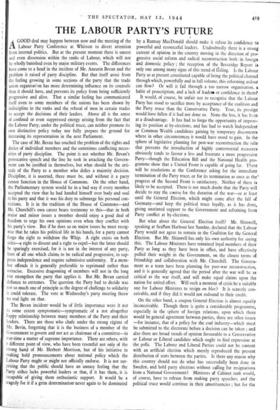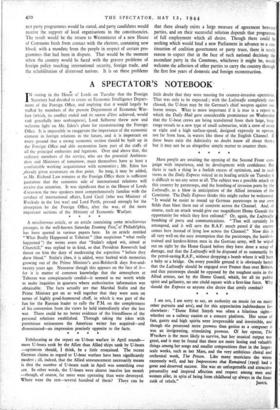THE LABOUR PARTY'S FUTURE
AGOOD deal may happen between now and the meeting of the Labour Party Conference at Whitsun to divert attention from internal politics. But at the present moment there is unrest and even dissension within the ranks of Labour, which will not be wholly banished even by major military events. The differences have come to a head in the incident of Mr. Aneurin Bevan and the problem it raised of party discipline. But that itself arose from the feeling growing in some sections of the party that the trade union organisaton has more determining influence on its counsels than it should have, and prevents its policy from being sufficiently progressive and alive. That a similar feeling has communicated itself even to some members of the unions has been shown by indiscipline in the ranks and the refusal of men in certain trades to accept the decisions of their leaders. Above all is the sense of confined or even suppressed energy arising from the fact that the Labour Party, under the political truce, can neither promote its own distinctive policy today nor fully prepare the ground for increasing its representation in the next Parliament.
The case of Mr. Bevan has touched the problem of the rights and duties of individual members and the sometimes conflicting neces- sities of party discipline. The point is not whether Mr. Bevan's provocative speech and the line he took in attacking the Govern- ment can be justified in themselves, but what should be the atti- tude of the Party to a member who defies a majority decision. Discipline, it is asserted, there must be, and without it a party cannot function in the House of Commons. On the other hand, the Parliamentary system would be in a bad way if every member accepted the view that he had handed himself over body and soul to his party and that it was his duty to submerge his personal con- victions. It is in the tradition of the House of Commons—and Mr. Churchill's own career bears testimony to this—that in both major and _minor issues a member should enjoy a good deal of freedom to urge his own opinions even when they conflict with his party's view. But if he does so on major issues he must recog- nise that he takes his political life in his hands, for a party cannot forgo the right to withdraw the Whip. A right exists on both sides—a right to dissent and a right to expel—but the latter should be sparingly exercised, for it is not in the interest of any party, least of all one which claims to be radical and progressive, to sup- press independence and require submissive uniformity. If a mem- ber offends it is generally preferable to reprimand rather than ostracise. Excessive dragooning of members will not in the long run strengthen the party that applies it. But Mr. Bevan carried defiance to extremes. The question the Party had to decide was not so much one of principle as the degree of challenge to solidarity it could tolerate. The vote at Wednesday's party meeting threw no real light on that.
The Bevan incident would be of little importance were it not to some extent symptomatic—symptomatic of a not altogether happy relationship between many members of the Party and their leaders. There are those who chafe under the strong regime of Mr. Bevin, forgetting that it is the business of a member of the Government to govern and not act as chairman of a committee—in war-time a matter of supreme importance. There are others, with a different point of view, who have been resentful not only of the strong hand of Mr. Herbert Morrison, but of his initiative in making bold pronouncements about national policy which the Labour Party might or, might not officially endorse. It is not sur- prising that the public -should have an uneasy feeling that the Party either lacks powerful leaders or that, if it has them, it is incapable of giving them enthusiastic support. It would be a tragedy for it if a grim determination' never again to be dominated by a Ramsay MacDonald should make it refuse its confidence to powerful and resourceful leaders. Undoubtedly there is a strong current of opinion in the country moving in the direction of pro- gressive social reform and radical reconstruction both in foreign and domestic policy ; the reception of the Beveridge Report is only one among many signs of this trend of feeling. Is the Labour Party as at present constituted capable of being the political channel through which, powerfully and in full volume, this reforming ardour can flow? Or will it fail through a too narrow organisation, a habit of proscription, and a lack of leadem or confidence in them?
It would, of course, be unfair not to recognise that the Labour Party has stood to sacrifice more by acceptance of the coalition and the Party truce than the Conservative Party. True, its prestige would have fallen if it had not done so. None the less, it has ben at a disadvantage. It has had to forgo the opportunity of improv- ing its position at by-elections, and has had to watch Independent or Common Wealth candidates gaining by temporary discontents where in other circumstances it would have stood to gain. In the sphere of legislative planning for post-war reconstruction the rule that prevents the introduction of highly controversial measures obviously tends to favour a less and frustrate a more progressive Party—though the Education Bill and the National Health pro- gramme show that a United Front is capable of going far. There will be resolutions at the Conference asking for the immediate termination of the Party truce, or for its termination as soon as the' progress of the Second Front is satisfactory. Neither of these is likely to be accepted. There is not much doubt that the Party will decide to stay the course for the duration of the war—or at least until the General Election, which might come after the fall of Germany—and keep the political truce loyally, as it has done, giving unstinted support to the Government and refraining from Party conflict at by-elections.
But what about the General Election itself? Mr. Shinwell, speaking at Sealiam Harbour last Sunday, declared that the Labour Party would not agree to remain in the Coalition for the General Election. But Mr. Shinwell has only his own authority for saying this. The Labour Ministers have remained loyal members of their Party as long as they have been in office, and have effectively pulled their weight in the Government, on the closest terms of friendship and collaboration with Mr. Churchill. The Govern.. ment as a team have been planning for post-war reconstruction, and it is generally agreed that the period after the war will be as critical as the war itself, and will make equal claims upon the nation for united effort. Will such a moment of crisis be a suitable one for Labour Ministers to resign en bloc? It is scarcely con- ceivable, and if they did it would not redound to their credit.
On the other hand, a coupon General Election is almost equally inconceivable. Though there is quite a considerable programme, especially in the sphere of foreign relations, upon which there would be general agreement between parties, there are other issues —for instance, that of a policy for the coal industry—which must be submitted to the electorate before a decision can be taken ; and also there are broad trends of opinion favourable to a Conservative or Labour or Liberal candidate which ought to find expression at the polls. The Labour and Liberal Parties could not be content with an artificial election which merely reproduced the present distribution of seats between the parties. Is there any reason why this country should not do what has successfully been done in Sweden, and hold party elections without calling for resignations from a National Government? Ministers of Cabinet rank would, of course, have to refrain from making party speeches, and the political truce would continue in their constituencies ; but for the rest party programmes would be stated, and party candidates would receive the support of local organisations in the constituencies. The result would be the return to Westminster of a new House of Commons fresh from contact with the electors, containing new blood, with a mandate from the people in respect of certain pro- grammes that had been in dispute. That would be the moment when the country would be faced with the gravest problems of foreign policy touching international security, foreign trade, and the rehabilitation of distressed nations. It is on these problems that there already exists a large measure of agreement between parties, and on their successful solution depends that programme of full employment which all desire. Though there could be nothing which would bind a new Parliament in advance to a con- tinuation of coalition government or party truce, there is surely reason to expect that in the face of such national decisions the ascendant party in the Commons, whichever it might be, would welcome the adhesion of other parties to carry the country through the first few years of domestic and foreign reconstruction.



























 Previous page
Previous page